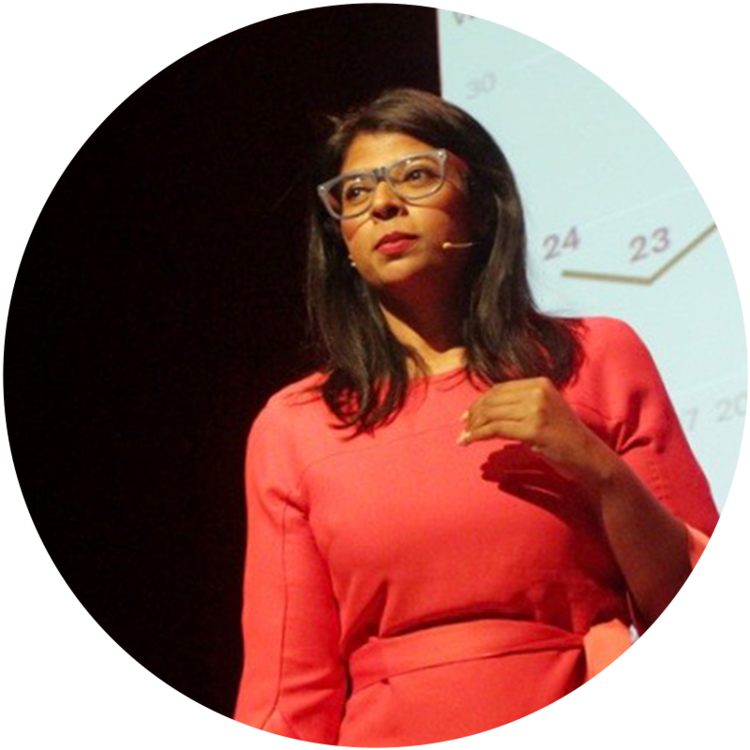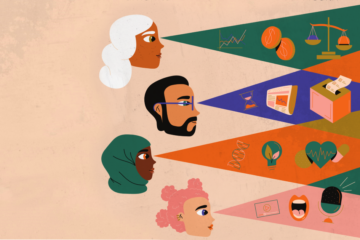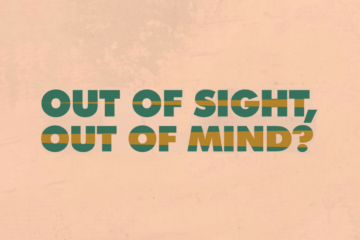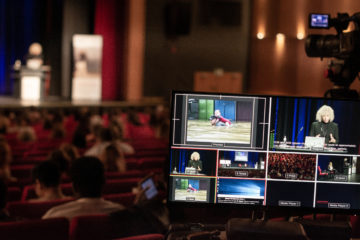Feminist Humanitarian Action:
From Affirmation to Transformation
On behalf of Médecins Du Monde, the German Red Cross, the Berlin Chamber of Physicians and Médecins Sans Frontières, we invited you to last year’s Humanitarian Congress Berlin: ‘Feminist Humanitarian Action: From Affirmation to Transformation’.
Last year’s congress was held from October 11 – 13, 2022
DRAFT PROGRAMME
We strived to make that event as accessible and inclusive as possible. The event had live captions in English and live translations into French (and Dari for the ‘Afghanistan from a gendered lens’ panel). For better screen readability, you could download the agenda here.
DAY 1 Tue 11 Oct
DAY 2 Wed 12 Oct
DAY 3 Thu 13 Oct
Tuesday, October 11
12:50 – 13:00 (CEST)
Online Panel
13:00 – 13:25 (CEST)
Online Panel
A Keynote Speech by Aarathi Krishnan
Join the Zoom panel here.
Description & Speaker
“By choosing to center humanitarian action on feminist principles, we intentionally choose to center our work on equity and justice – and not one of patriarchal charity that has long shackled our approaches. We choose a life where we can support all to thrive, not merely to be passive beneficiaries of aid.”

Aarathi Krishnan
An expert on feminist and decolonized futures and institutional transformation
13:25 – 14:30 (CEST)
Online Panel
Description & Speaker
Humanitarian challenges and crises are increasing, developing new dynamics and becoming more complex – and, as a result, humanitarian needs are also rising. Women and girls are most vulnerable to these compounding challenges and multi-crises, as they are hit hardest by the growing impacts. For example, women and girls are 14 times more likely to die than men during a disaster, due to a range of factors.
The effects of these challenges and crises on the safety, mental health and psychosocial well-being of women and girls deserve far greater recognition in the humanitarian system. Understanding the scale and compounding effects of multi-crises on women and girls is essential for having an effective and holistic approach in place. There is also a need to acknowledge the potential of women and girls in promoting resilience and preventing distress.
This panel discussion considered different perspectives on feminist approaches for the humanitarian system, outlined the existing gaps, and analysed a joint way forward. The high-level speakers engaged in a dynamic conversation about which mechanisms a feminist approach could offer, in terms of developing solutions or even helping to prevent further humanitarian crises, and what that means for the humanitarian principles.
Host:
Aarathi Krishnan | Expert on Feminist and Decolonized Futures and Institutional Transformation
Speaker:
Susanne Fries-Gaier | Humanitarian Director at Germanys’ Federal Foreign Office
Bolormaa Nordov | Secretary General, Mongolia Red Cross
Christine Mutuku | Community Speaker Kenya
Dr. Lina Abi Rafeh | Women’s Rights Expert and Gender Equality Advocate
15:00 – 16:00 (CEST)
Online Panel
Description & Speaker
The Panel discussion on the prioritization of Sexual and Reproductive Health (SRH) in conflict and other crises focused on two main topics:
How do we prioritize SRH services? To analyse and critique the extent to which patriarchal structures within our own organizations shape the way we deliver SRH services.
What SRH services and delivery modes do we prioritize? To analyse the relevance of the Minimum Initial Package (MISP) from a feminist approach.
Regarding the first question, panel members were invited to reflect, among other things, upon:
To what extent did patriarchal and colonial dynamics shape decision-making processes within the organizations where we work and on examples of how these manifested? What actions are we concretely taking to identify and address formal and informal power relations that reinforce patriarchal power within our own humanitarian action and among our own teams?
Furthermore, panel members discussed the second topic and tried to find answers about:
To what extent should engagement with communities, as possible, realistic, and desirable in emergencies, in view of a number of competing priorities when it comes to the delivery of SRH in emergencies? Is a holistic approach that consider social determinants of gender inequality, and that aims to empower women and girls, in fact, translated into practice in emergencies? Could crises offer new opportunities to shift norms and social, legal, and regulatory frameworks with regards to SRH?”
Host:
Federica Villa | Gender based Violence in Humanitarian Settings Advisor for Médecins du Monde (MdM)
Speaker:
Diana Manilla Arroyo | Public Health in Emergencies Officer at the International Federation of Red Cross and Red Crescent Societies (IFRC)
Dr. Amina Aminu Dorayi | Nigeria Country Director at Pathfinder International
Rania Abu Elhassan | Regional Humanitarian Advisor at International Planned Parenthood Federation Africa Region
16:30 – 17:30 (CEST)
Online Panel
Description & Speaker
Afghanistan has one of the highest maternal mortality rate in the world alongside with one of highest birth rates. With the changing political situation and the assestion of power through the Taliban the situation for woman and girls have drastically declined.
For women and girls in Afghanistan, this had a massive impact and plays a central role in the development of their future. In the humanitarian context and with regard to the cooperation with local professionals, this means that, for example, female medical staff could be lost in the medium to long term, and the quality of medical services for women and girls could decline.
The question that humanitarian organizations must ask themselves is how they can address these challenges together with the Afghan population. At the same time, in order to gain the necessary access to all areas of the country, humanitarian organizations must cooperate with Taliban leaders. How can we deal with this dichotomy?
The panel was designed to present feminist perspectives from Afghanistan in order to discuss ways in which support from the humanitarian sector could be provided in exchange with humanitarian actors. Specifically, it aimed to:
- Show what consequences anti-feminist movements can have for the future development of girls and women, especially with regard to future medical personnel.
- Demonstrate the role of humanitarian principles in the context of cooperation with humanitarian actors and pro-feminist organizations in Afghanistan.
- Highlight what humanitarian actors can improve/change to support feminist movements in Afghanistan.
Host:
Irwin Loy | Policy Editor at The New Humanitarian
Speaker:
Zuhra Wardak | Director of Compliance, Ethics and Gender and the co-leader of the Gender in Humanitarian Working Group at IRC in Afghanistan
Mariam Safi | Founding and Executive Director of the Organization for Policy Research & Development Studies Organization for Policy Research and Development Studies (DROPS)
Sofia Ramyar | Youth Activist Leader in Afghanistan
Asila Wardak | Human Rights and Women’s Right Activist from Afghanistan and one of the Founders of Afghan Women’s Network
18:00 – 21:00 (CEST)
In Person
Evening Opening Event (IN PERSON)
Closed event
Wednesday, October 12
13:00 – 14:00 (CEST)
Online Panel
Description & Speaker
LGBTQI+ persons are criminalized in many contexts where humanitarian work is done and face many oppositions. Stigmatization and discrimination due to a cultural/religious knowledge gap of affected patients often plays a role in practice and in the projects and prevents these group of people from receiving adequate medical treatment.
What could the humanitarian system learn from feminist approaches to derive concrete actions for practice, so that anti-discriminatory measures are implemented beyond mere rhetoric and to bridge the gap between inaction and real transformation?
Host:
Casey O’Connor | Project Lead of MSF’s LGBTQI+ Inclusion for Health Projects
Speaker:
Lana Woolf | Co-founder and International Programs Director of Edge Effect
Megan Daigle | Senior Research Fellow in the Humanitarian Policy Group
Ribal Maatouk | Research and Capacity Development Consultant on SOGIESC and Public Health in Humanitarian Action in Lebanon
14:30 – 15:30 (CEST)
Online Panel
Feminist Struggles against the Patents Regime
Join the Zoom panel here.
Description & Speaker
Breast cancer is the most common cancer worldwide and the number of cases is increasing. But high drug prices mean many people don’t have access to adequate treatment and selects who has access to medication and who not. Structural inequalities such as economic conditions therefore play a major role in the chances of surviving the disease especially in the global south. Because of this reason feminist movements are organizing transnationally actions for equitable access to breast cancer treatment.
Concrete topics on this Panel were the effects of intellectual property rights on equitable access to breast cancer treatment and and recent developments in countries of the global south. And even more broadly, we discussed in what extend feminist approaches provide new perspectives for the access to medicines movement.
Host:
Leena Menghaney | Coordinator of the Médecins Sans Frontières (MSF) Access Campaign in India
Speaker:
Baone Twala | Human Rights Advocate and Patent Law Expert and Legal Researcher at SECTION27
Priti Krishtel | Health Justice Lawyer and Co-Founder and Co-Executive Director of the Initiative for Medicines, Access, and Knowledge (I-MAK)
16:00 – 17:00 (CEST)
Online Panel
Humanitarian Care Practices: A Critical Perspective
Join the Zoom panel here.
Description & Speaker
Care work is highly gendered, undervalued and often invisible, e.g., 76% of the professionals in the healthcare sector are women. The pandemic revealed once more how essential care work is, nevertheless, the unjust structures did not change. Feminists have been addressing this issue for decades. Care is at the center of humanitarian work, but at the same time, debates and discourses often miss the (mental) needs and necessities of people in (humanitarian) care professions. What critiques and proposals do feminist approaches provide? Could a care-oriented society be a solution?
Host:
Goda Milasiute | Research Associate at the Centre for Humanitarian Action (CHA)
Speaker:
Meera Ghani | Researcher, Facilitator, Organizer and Careworker; Consultant at the Moxie Consultancy Collective
Dr. Gemma Houldey | Wellbeing Advisor and Facilitator for Aid Sector Professionals and Change-Makers
Dr. Deepta Chopra | Social Policy Researcher at Institute of Development Studies
Mirjam von Bibra | Pediatric Resident at Klinikum Bremen-Mitte
Thursday, October 13
12:30 – 13:30 (CEST)
Online Panel
An (Un-) Equal Relationship: Localisation and Power
Join the Zoom panel here.
Description & Speaker
From Charity to Tranformative Justice.
In order to try and overcome the immense global challenges, complex crisis contexts and growing humanitarian needs, humanitarian actors need to rethink and reshape the way they collaborate and communicate – with communities and civil society but also other Organisations and Institutions on different levels. How can systems of collaboration be critically reviewed and improved from a feminist point of view, taking into consideration patriarchal systems, power imbalances and postcolonial structures? This also means looking at Localisation, Decolonialization and analysis of local needs from a feminist approach. How can synergies be mutual beneficial, more solidaric and sustainable, being a driver for transformation? What can humanitarian actors learn from more holistic approaches? How can they tackle structural causes of humanitarian needs and current crisis? What can we learn from other concepts such as Mutual Aid?
Host:
Isadora Quay | Global Gender in Emergencies Coordinator at CARE International
Speaker:
Misun Woo | Regional Coordinator Asia Pacific Forum on Women, Law and Development
Gabriele Köhler | Women Engage for a Common Future (WECF) Board Member, Independent Development Economist, Advisor and Publicist
Adenike Oladosu | Youth and Climate Activist based in Nigeria
Muzna Dureid | Senior Programe Officer at The White Helmets, analyst and researcher
14:00 – 15:00 (CEST)
Online Panel
Feminist Pathways to a Climate Just Future
Join the Zoom panel here.
Description & Speaker
The climate crisis is an intersectional issue, and it hits the most vulnerable the hardest. It is closely linked to race, class and gender inequalities, but unfortunately a profound structural analysis linking all these aspects is still lacking in humanitarian action. For example, access to sexual and reproductive health is difficult in areas affected by climate-related disasters, women are the first to reduce their food intake in times of food insecurity and the death toll of women and girls due to extreme weather events is much higher.
In this panel discussion, we wanted to debate what changes and steps were necessary from feminist perspectives to achieve climate justice in humanitarian contexts. We wanted to look at best practices and gender transformative projects based on climate justice that already existed in humanitarian contexts. Moreover, we wanted to discuss aspects and demands that were particularly relevant for Cop27 regarding humanitarian contexts.
Host:
Elisa de Siqueira | Advocacy Officer Climate Crisis at Médecins Sans Frontières
Speaker:
Maria Reyes | Full-time Climate and Human Rights Activist at the Indigenous Futures Network
Dr. Asha Mohammed | Secretary General of the Kenyan Red Cross
Dr Heather McMullen | Global Public Health Scientist at Queen Mary University of London
15:30 – 16:30 (CEST)
Online Panel
Global Food Crisis: The Price of Hunger
Join the Zoom panel here.
Description & Speaker
According to the WFP, as many as 828 million people suffer from hunger in 2022, the number of those facing acute food insecurity has soared – from 135 million to 345 million – since 2019. A total of 50 million people in 45 countries are teetering on the edge of famine. This situation has been caused by a combination of several factors (conflict, climate shocks, Covid-19… with the Ukraine conflict as tipping point), and didn’t come unexpected.
There are many indications, that looming famine and food insecurity for an increasing number of people is long from being over soon. It could become worse in 2023 when food becomes unaffordable for even more people. But is it a global food shortage, or more a “price or market crisis, including pricing of food, access and distribution. The future perfect storm is looming, with climate change effects deteriorating more quickly, food could become unavailable at a higher rate.
Women are harder hit by above mentioned shocks than men, and more likely to suffer from poverty and food insecurity. To bring in a feminist perspective, all of these factors have structural causes and responsible actors, acting in a patriarchal and neoliberal model of the current capitalistic market. How can a feminist perspective help humanitarian actors besides fighting the effects also meaningfully contribute to tackle these structural causes within their scope of work, without becoming activist movements?
Host:
Shemeles G. Haile | Country Representative Ethiopia Médecins du Monde (MdM)
Speaker:
Farida Akhter | Founding Executive Director of UBINIG, Dhaka, a Policy and Research Organization in Bangladesh
Marc Cohen | Senior Researcher for Aid Effectiveness at Oxfam America
Dr. Jessica Fanzo | Bloomberg Distinguished Professor of Global Food & Agricultural Policy and Ethics
Prof Dr. Ruth Philipps | Associate Professor in the Social Work and Policy Studies Program, University of Sydney
Receive the livestream links via email and do not miss any updates:



